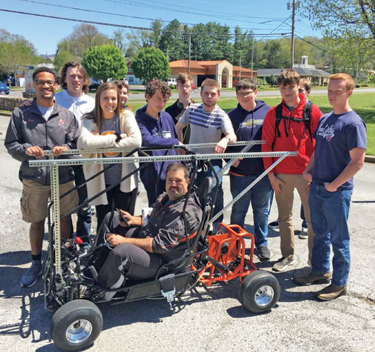BMS to host TN Solar Go-Kart Challenge
Published 8:08 am Monday, April 29, 2019

- File Photo Elizabethton High School students and teacher David Campbell pose with the EHS' kart days before last year's Solar Go Kart Race at Bristol Motor Speedway.
On Tuesday, May 7, local high school students will take to the track once again at Bristol Motor Speedway. Since 2016, these future engineers have been competing at BMS in the Solar Go-Kart Challenge. The Go-Karts are designed to absorb the energy from the sun and charge their batteries to keep their karts to drive as many laps as possible in a given time period.
This year, the TN Solar Go-Kart Challenge will be to complete the maximum number of laps in a two-hour time period.
Students have been working all year to improve their solar go-karts from last year’s event. The concept being focused on is iteration — to work through the design process over and over again aiming to obtain the best results possible. Jonathan Casteel is leading the effort this year in organizing the event. Casteel is the engineering teacher at Sullivan Central High School, and his team has competed since the first year of this exciting new alternative energy project. Originally started as an energy grant from the state of Tennessee, this challenge has given students the opportunity to improve their solar go-karts each year. This year is hoped to be the best yet as hundreds of students from 12 different high schools will gather together at the world’s fastest half-mile track.
This event is free to the public, and we urge everyone who can to come out and support these fine young women and men who are the future engineers of this country. The two-hour endurance race will begin at 11 a.m., and gates will be opened at 9 a.m. Anyone interested in attending will need to enter at the turn three gate, entrance 9. Trophies will be awarded to the first, second, and third place teams; and other awards will be given as well.
Through this program students learn about electrical, mechanical, and automotive engineering; as well as the importance of safety in and off the racetrack. Some of these solar go-karts have run as much as 40 mph in the past couple of years, so all drivers must wear an approved helmet, proper clothing, and use a 5-point restraining system with their approved racing seat. These karts undergo thorough inspections to ensure that all rules and safety procedures are followed. This year’s karts will run a 24volt, 105amp hour electrical system that powers an electric motor to drive the karts.
Students have the opportunity to select a variety of solar panels used to keep the batteries charged. The real test is how well each team engineers their solar go-kart systems to get the most out of their batteries and carry them the most laps in the two-hour time frame. Some teams choose to go as fast as possible to get in the most laps, but risk draining their batteries early and not making it to the end of the two hours. Other teams will choose to keep it slow and steady until the last laps of the race so they will endure the time constraint. If karts drop below 10 mph for more than three laps, they must be pulled from the race for safety reasons.
Which team will make it to the end this year? You’ll have to come out and see for yourself as we host our third annual TN Solar Go-Kart Challenge at Bristol Motor Speedway on May 7.




